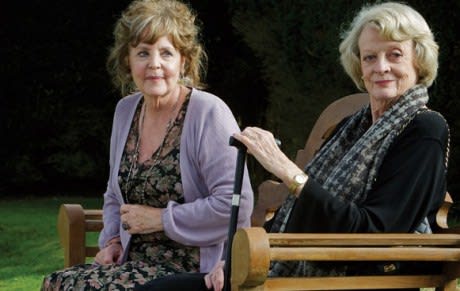Following in the footsteps of The Best Exotic Marigold Hotel, Quartet (Dustin Hoffman's directorial debut) is the latest movie to centre upon characters living out the twilight of their lives. It seems there is a sizable market for entries that deal with the day-to-day life of retirees; it's just a shame that these retirees seem to need to be disturbingly peppy to attain box-office success.
The story presented here — aging musicians and singers preparing to put on a concert to raise funds so they can keep their luxurious retirement home operational — is formulaically "heart-warming" and rife with clichéd inspiration, such as "it's never too late to follow your heart."
Had Quartet lightened its light-heartedness to develop a narrative that acknowledged the frustrating contradictions that face an aging population — the discord between ability and desire, not just sexually but physically, or the emotional toll of trying to appreciate the present while continually thinking about the past and fearing the future — in a candid rather than cavalier fashion, it would have felt honest and the final concert scenes would have been more powerful.
Since death is only cursorily addressed, Quartet ends up feeling like a less annoying, more elderly version of Glee. The film didn't need to be musical version of Michael Haneke's Amour (a heartbreaking and powerfully candid tale about the cruel realities of life and aging in the aftermath of a stroke), but it would have benefitted from demonstrating some restraint in its optimism. Life is a bewildering gift, yes, but it's also cruel and filled with pain.
That said, the decision to focus on the positive side of things is understandable — optimism leads to better word of mouth, doesn't it? And Quartet's target audience will be pleased to watch the excellent and engaging ensemble cast Hoffman assembled, most of whom do well with their archetypal roles.
Pauline Collins (Shirley Valentine) is marvellous as Cissy, a cheery woman suffering from dementia, while Billy McConnolly (Mrs. Brown, Head of the Class) plays the salacious Wilf, a man whose libido and flirtatious ways act as a shield to deny death, as someone equally capable of being charming or aggravating. Unfortunately, the magnificent Maggie Smith (Downton Abbey) is given little to do with Jean, the new arrival and supposed diva.
The most moving section of this film comes at an unexpected point: during the closing credits. As the end titles roll, photos of the actors, actresses and musicians who played the elderly residents in Quartet are juxtaposed against images of their younger selves playing other roles on stages or concert halls decades ago.
In imagining the lives lived and in seeing the evident physical differentiation between these pairs of images, the film manages to imbue its final moments with dignity, acknowledging the only universal human characteristic — our mortality.
(Alliance)The story presented here — aging musicians and singers preparing to put on a concert to raise funds so they can keep their luxurious retirement home operational — is formulaically "heart-warming" and rife with clichéd inspiration, such as "it's never too late to follow your heart."
Had Quartet lightened its light-heartedness to develop a narrative that acknowledged the frustrating contradictions that face an aging population — the discord between ability and desire, not just sexually but physically, or the emotional toll of trying to appreciate the present while continually thinking about the past and fearing the future — in a candid rather than cavalier fashion, it would have felt honest and the final concert scenes would have been more powerful.
Since death is only cursorily addressed, Quartet ends up feeling like a less annoying, more elderly version of Glee. The film didn't need to be musical version of Michael Haneke's Amour (a heartbreaking and powerfully candid tale about the cruel realities of life and aging in the aftermath of a stroke), but it would have benefitted from demonstrating some restraint in its optimism. Life is a bewildering gift, yes, but it's also cruel and filled with pain.
That said, the decision to focus on the positive side of things is understandable — optimism leads to better word of mouth, doesn't it? And Quartet's target audience will be pleased to watch the excellent and engaging ensemble cast Hoffman assembled, most of whom do well with their archetypal roles.
Pauline Collins (Shirley Valentine) is marvellous as Cissy, a cheery woman suffering from dementia, while Billy McConnolly (Mrs. Brown, Head of the Class) plays the salacious Wilf, a man whose libido and flirtatious ways act as a shield to deny death, as someone equally capable of being charming or aggravating. Unfortunately, the magnificent Maggie Smith (Downton Abbey) is given little to do with Jean, the new arrival and supposed diva.
The most moving section of this film comes at an unexpected point: during the closing credits. As the end titles roll, photos of the actors, actresses and musicians who played the elderly residents in Quartet are juxtaposed against images of their younger selves playing other roles on stages or concert halls decades ago.
In imagining the lives lived and in seeing the evident physical differentiation between these pairs of images, the film manages to imbue its final moments with dignity, acknowledging the only universal human characteristic — our mortality.
